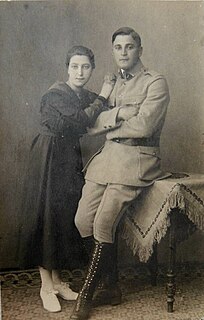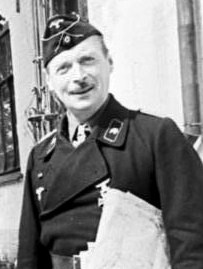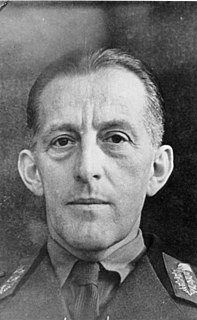 W
WErich Bauer, sometimes referred to as "Gasmeister", was a low-level commander in the SS of Nazi Germany and a Holocaust perpetrator. He participated in Action T4 program and later in Operation Reinhard, when he was a gas chamber operator at Sobibór extermination camp.
 W
WHans Fuglsang-Damgaard was a bishop of the diocese of Copenhagen for 25 years including the years of the German occupation.
 W
WHermann Gauch was a Nazi race theorist noted for his dedication to Nordic theory to an extent that embarrassed the Nazi leadership when he claimed that Italians were "half ape". Briefly adjutant to Heinrich Himmler, his career was later stalled by Himmler himself. During World War II he served with distinction in the Yugoslav campaign.
 W
WWalter Hörnlein was a German general in the Wehrmacht during World War II, who commanded the Großdeutschland Division. He was a recipient of the Knight's Cross of the Iron Cross with Oak Leaves.
 W
WHans Kahle was a German journalist, communist, and head of the Volkspolizei in Mecklenburg.
 W
WLudwig Kasner was a German policeman of Polish ethnicity who worked with the Berlin Police. He was the paternal grandfather of German Chancellor Angela Merkel, whose birth name Kasner had been Germanized from Kaźmierczak by Ludwig Kasner in 1930.
 W
WHeinrich Kleinschroth was an amateur German tennis player who found success in the early 20th century, mainly in doubles competitions.
 W
WHermann Köhl was a German aviation pioneer and pilot of the first transatlantic flight by a fixed-wing aircraft from East to West.
 W
WCarl Menckhoff was a German First World War fighter ace. He was credited with 39 confirmed victories, the majority over opposing fighter aces. Already in his 30s when he learned to fly in February 1915, he was one of the oldest pilots in the Luftstreitkräfte. After being severely wounded in infantry service, Menckhoff transferred to Jagdstaffel 3 as a vizefeldwebel, afterwards being commissioned as an officer. He won the German Empire's most prestigious decoration, the Pour le Mérite, and was given command of Jagdstaffel 72.
 W
WGeorg Wilhelm Pabst was an Austrian film director and screenwriter. He started as an actor and theater director, before becoming one of the most influential German-language filmmakers during the Weimar Republic.
 W
WRudolf Querner was a German SS functionary during the Nazi era. He served as the Higher SS and Police Leader in Austria and Germany and was responsible for the evacuations and death marches from concentration camps at the end of the war. Arrested by the Allied authorities, he committed suicide in prison.
 W
WHyazinth Graf Strachwitz was a German officer of aristocratic descent in the Wehrmacht during World War II. He was a recipient of the Knight's Cross of the Iron Cross with Oak Leaves, Swords and Diamonds.
 W
WWilhelm Josef Ritter von Thoma was a German army officer who served in World War I, in the Spanish Civil War, and as a general in World War II. He was a recipient of the Knight's Cross of the Iron Cross.
 W
WKurt Oskar Heinrich Ludwig Wilhelm von Tippelskirch was a general in the Wehrmacht of Nazi Germany during World War II who commanded several armies and Army Group Vistula. He surrendered to the United States Army on 2 May 1945. Tippelskirch wrote several books, such as the History of the Second World War, 1951. He died in 1957.
 W
WJosef Wagner was from 1931 the Nazi Gauleiter of Gau Westphalia-South and, as of December 1934, also of Gau Silesia. In 1942 he was expelled from the Nazi Party (NSDAP), imprisoned by the Gestapo, and likely executed around the time of end of the war in Europe.